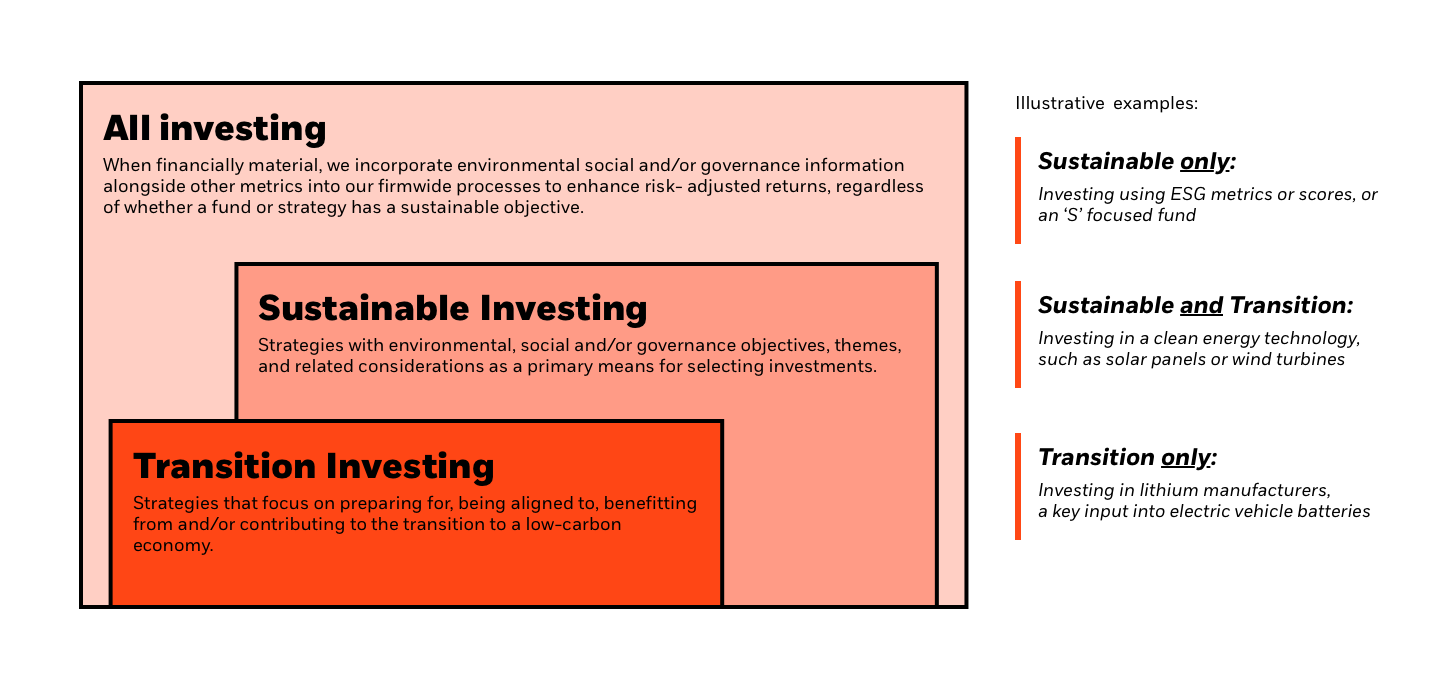Sustainable and transition investing
TEXT: The world is transitioning to a low-carbon economy.
TEXT: Technological innovation is spreading
Carolyn Weinberg: Wow, so this is the nerve center?
Dickon Pinner: Each one of those is one of these automated trucks?
Alvin Foo: Automated guided vehicles.
TEXT: Climate and transition policy initiatives are driving transformation.
Chris Kaminker: Recent shifts in U.S. policy have sparked a global clean energy race that is creating investment opportunities on both sides of the Atlantic.
TEXT: Companies are transforming and supply chains are evolving
Martin Lundstedt: This is the beauty.
Mark Wiedman: Fully electric!
Martin Lundstedt: Fully electric.
Mark Wiedman: I am driving a proper truck.
Martin Lundstedt: Yeah, yeah, absolutely.
TEXT: The shape of the global economy is changing.
TEXT: And new investment risks and opportunities are emerging.
Anne Valentine Andrews: The low-carbon transition is a once-in-a-lifetime opportunity for our clients and BlackRock has the breadth, expertise and whole portfolio solutions to meet our clients needs.
CONCLUSION
VO: The transition to a lower-carbon world is happening.
VO: And at BlackRock…
VO: We’re ready.
Clients are increasingly asking BlackRock how to mitigate risks to their portfolios, and capture investment opportunities associated with sustainability and the transition to a low-carbon economy. As a fiduciary, we invest on our clients’ behalf to help them meet their investment objectives.
BlackRock’s approach to sustainable investing and the transition to a low-carbon economy is rooted in our fiduciary duty to clients. We start by understanding our clients’ investment objectives and provide choice to meet their needs; we seek the best risk-adjusted returns within the scope of mandates they give us; and we underpin our work with research, data, and analytics.
What is sustainable investing?
Sustainable investing refers to strategies which leverage environmental, social and/or governance (ESG) objectives, themes, and related considerations as a primary means for selecting investments.
Sustainable investing products
The four categories of the BlackRock sustainable investing platform—Screened, Uplift, Thematic and Impact—adopt different strategies to help investors to meet their investment objectives.
To explore the sustainability characteristics of specific funds, visit the product pages of BlackRock.com and iShares.com.
What is transition investing?
The transition to a low-carbon economy is among a handful of major structural shifts having the potential to rewire economies, sectors and businesses.
Today, not all sustainable strategies are transition, and not all transition strategies are sustainable. By understanding the relationship between these types of investing strategies, investors can identify the products and solutions that meet their objectives.
BlackRock defines transition investing as investing with a focus on preparing for, being aligned to, benefitting from and/or contributing to the transition to a low-carbon economy.

Source: BlackRock, September 2023. For illustrative purposes only. This graphic represents the relationship between sustainable investing and transition investing based on current AUM and may not be drawn to scale. For more information, please refer to our Firmwide ESG Integration Statement.
How is the transition creating investment opportunities?
Structural shifts associated with the low-carbon transition – technological innovation, consumer and investor preferences for lower-carbon products, and shifts in government policies – are reshaping production and consumption and spurring capital investment.
Three forces are driving this economic transformation: 1

This is creating investment opportunities. For example, average annual spend in the energy system through 2050 is estimated to reach US$4 trillion per year, up from US$2.2 trillion over the last decade. 2,3
Transition investing products
Research
We have been at the forefront of helping investors understand the impact of climate and sustainability risk on portfolios. Our team of in-house specialists, including sector specialists and climate scientists, are uncovering insights to power investments.
What is ESG integration?
BlackRock defines ESG integration to be the practice of incorporating financially material environmental, social and governance (ESG) data or information into our firmwide processes with the objective of enhancing risk-adjusted returns of our clients’ portfolios. This applies regardless of whether a fund or strategy has a sustainable or ESG-specific objective.
ESG refers to specific considerations that can be used as part of investment decision-making. Examples of ESG information could include:
BlackRock has a framework for ESG integration that permits a diversity of approaches across different investment teams, strategies and particular client mandates.
For more detail, refer to BlackRock’s ESG Integration Statement.





